"Secret" monument of Alexander the Great in Skopje angers Athens
Evelina Topalova, June 17, 2011
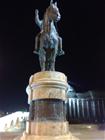 If one should judge about the greatness of a nation on the basis of the size of its monuments, then Macedonia is definitely a great country. A huge bronze 12 m high figure, accompanied by a 10m pedestal, is the newest Skopje's gain that has been transported from Florence and will be put up in the capital city within two weeks time. The whole composition, including the rider, the horse and a fountain, is worth some 10m euros, according to local media's calculations.
If one should judge about the greatness of a nation on the basis of the size of its monuments, then Macedonia is definitely a great country. A huge bronze 12 m high figure, accompanied by a 10m pedestal, is the newest Skopje's gain that has been transported from Florence and will be put up in the capital city within two weeks time. The whole composition, including the rider, the horse and a fountain, is worth some 10m euros, according to local media's calculations.
"A warrior on a horse" is the official name of this "bijou" but everybody knows that it 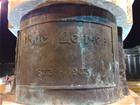 is actually a monument of Alexander the Great. The authorities have invented this abstract name to avoid angering Greece again. The trick however didn't work and the Greeks, as expected, reacted immediately by accusing the Macedonians of usurpation of their history and inflaming nationalism.
is actually a monument of Alexander the Great. The authorities have invented this abstract name to avoid angering Greece again. The trick however didn't work and the Greeks, as expected, reacted immediately by accusing the Macedonians of usurpation of their history and inflaming nationalism.
Let's put aside the issue of the monument's cost and the debates whether it fits in the city's landscape. The question is who needs such a megalomania? The whole project Skopje 2014, part of which is the controversial statue, is a potential generator of disputes with Macedonia's neighbours (see the project here - the video on the left). The so-called "new face" of Skopje envisages monuments of Tzar Samuil, Sts Cyril and Methodius, Naum ...
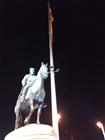 Obviously in search of its identity or in an attempt to gain recognition of it, Macedonia feels the need to tell the world via such monuments which of the historic figures belong to it and how did they contribute to the Macedonian (and world) history.
Obviously in search of its identity or in an attempt to gain recognition of it, Macedonia feels the need to tell the world via such monuments which of the historic figures belong to it and how did they contribute to the Macedonian (and world) history.
Raising monuments in parks, gardens and squares could indeed raise the popularity of the government among ordinary people (which was confirmed by the election results) but is not contributing at all to maintaining of good neighbourly relations, which is among the criteria for EU membership.
For 20 years now Greece has been unable to swallow the constitutional name of Republic of Macedonia, seeing in it territorial claims. The name dispute not only blocks Skopje's accession to NATO but also delays the start of the talks with the EU. 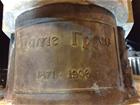
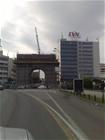 The two countries should be less concerned about this dull competition of who is more worthy and should focus instead on resolving the serious economic troubles they are facing. Macedonia is facing high unemployment rate of over 30% and outflow of FDI, while Greece is on the verge of default. Instead of participating in disputes over history, Skopje and Athens could demonstrate more flexibility and common sense and follow the example of Slovenia and Croatia that reached an agreement on their border dispute and will become soon equal partners in the EU.
The two countries should be less concerned about this dull competition of who is more worthy and should focus instead on resolving the serious economic troubles they are facing. Macedonia is facing high unemployment rate of over 30% and outflow of FDI, while Greece is on the verge of default. Instead of participating in disputes over history, Skopje and Athens could demonstrate more flexibility and common sense and follow the example of Slovenia and Croatia that reached an agreement on their border dispute and will become soon equal partners in the EU.
 Bakir Izetbegovic, Andrej Plenkovic | © Council of the EU
Bakir Izetbegovic, Andrej Plenkovic | © Council of the EU Aleksandar Vucic, Recep Tayyip Erdogan | © Serbian Presidency
Aleksandar Vucic, Recep Tayyip Erdogan | © Serbian Presidency Jean-Claude Juncker, Zoran Zaev | © European Commission
Jean-Claude Juncker, Zoran Zaev | © European Commission